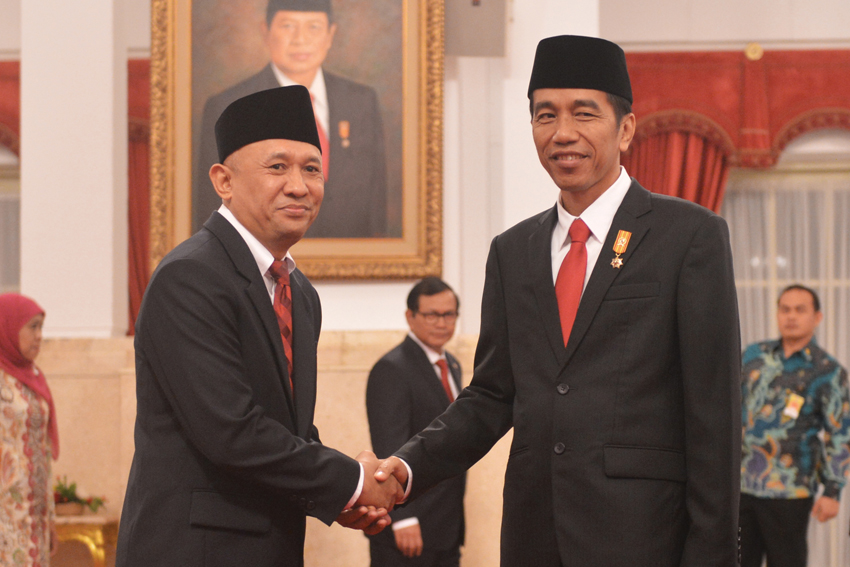The position of Presidential Chief of Staff was recently created by President Joko Widodo (Jokowi) and Teten Masduki is the second to take on the role. He sits down with The Worldfolio to talk about his new role, infrastructure investment and Indonesia’s improving business climate.

After more than six months as Chief of Staff what would you say are the Jokowi administration’s top priorities at the moment?
President Jokowi is now focusing on economic development. The three major priorities are infrastructure, deregulation and human resources development, we hope investment will increase, SMEs will be developed and our economy will grow.
Indonesia faces significant challenges in infrastructure development, but the benefits beyond connectivity are well known, with heightened spending on infrastructure likely to have a positive affect in terms of economic growth.
Our target economic growth when President Jokowi came to power was 7%, but now, after the global slow down, we have revised that figure to between 5% and 6%. Infrastructure spending will be focused on a number of key areas, including power generation through the 35,000-megawatt program, but also toll roads, railways, harbors and ports. Connectivity created by infrastructure we build is very important to minimize the cost of logistics. Currently we have some issues regarding the cost of logistics, for example the distribution of the logistics from west to east leaves a large gap. This has led to uneven economic growth between the western and eastern islands of Indonesia. The high cost of logistics also makes us less competitive. So, building infrastructure will have a huge positive impact on our economic growth.
The position of Chief of Staff is a recent one in Indonesia. What is your main role?
We are not an implementation agency; we are the back office of the President. We have to make sure that the ministries will implement all of the President’s agenda and promises. We interact with planning and budgeting on the ministerial level. Our core function is to influence the policy of the government based on the President’s priority and vision.
We need to make sure that the President’s priority programs are implemented. We have monitoring and evaluation programs for all of the ministries. We report to the President if we have found any problems in the implementation. So, this office is also taking part in the revision of certain programs, which means the job is not easy. Sometimes we have to take over certain functions of subordinate entities to ensure that implementation runs smoothly. I think the main problem of our government has previously been lack of coordination between different organizations, which is part of the reason the anti-corruption agenda and bureaucratic reform is so important. We want to make sure that our bureaucracy is efficient, transparent and we want Indonesia to be attractive for investors.
How is Indonesia progressing in terms of its ease of doing business ranking?
Indonesia’s ease of doing business is now ranked 109 and the President has instructed all of the ministries to work together to achieve a ranking of 40. We are working together with the Coordinating Ministry of Economic Affairs to achieve this target and I am also the chairman of the working group for deregulation, which will accelerate this process.
We have announced 12 economic policy packages thus far and we are still evaluating whether or not all the 12 packages will have a large impact on our economic growth target. If it is only a small impact, we will need to change it. We have to look at what the investors need in terms of incentives.
How is the government consulting and working with the private sector?
We have communicated with the private sector and consulted with them about what steps the government should take, and which policy should be reformed to improve the ease of doing business. They are very interested in the development of our infrastructure, especially in power generation; I think we have the biggest project in the world in power generation now – 35,000 megawatts.
Indonesia has previously had quite a low profile on the international scene. What is your current focus in communicating internationally?
Our focus now is to communicate our priorities to the target groups such as investors and the private sector. That’s why we are focused on deregulation, to make the investment climate better. What we do know is that the President has made a number of high profile international trips and he is always very clear that Indonesia is open for business and investment friendly. We are inviting investors to actually come and join us, to work with us. Indonesia’s growth is actually one of the highest in the region, even though for us it is still low.
Furthermore, Indonesia has a reputation as a leader in democratization and pluralism. We are a moderate Muslim country and we are tolerant because we are aware that Indonesia is very diverse.
0 COMMENTS